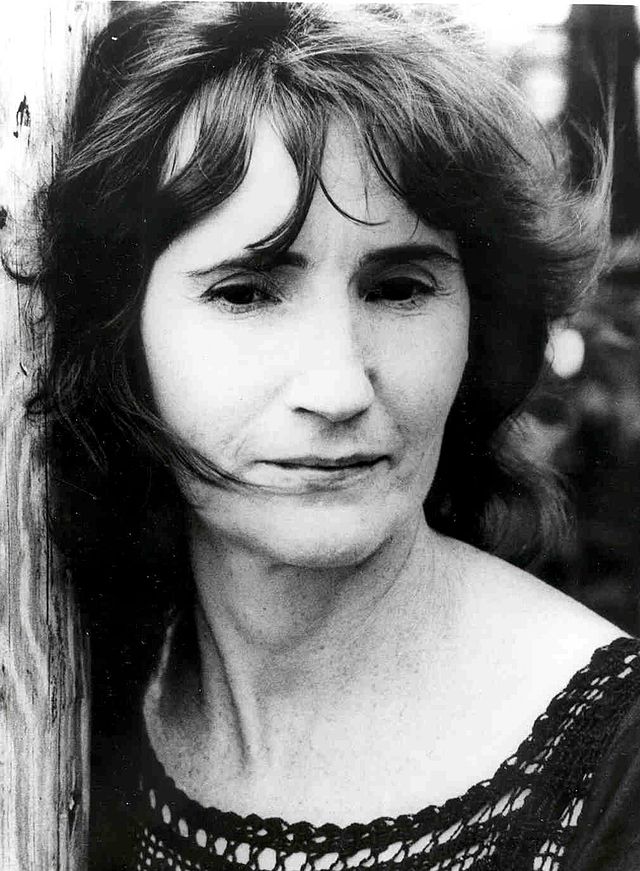BIOGRAPHICAL DETAILS
Full Name: Hazel Jane Dickens
Description: Vocalist , Composer, Bassist, USA
Known For: Member of the New Lost City Ramblers
Instruments: Vocals, Bass
Music Styles: Bluegrass
Location: United States of America
Date Born: 1st June 1935
Location Born: Mercer County, West Virginia, United States of America
Date Died: 22nd April 2011
Location Died: United States of America
CONTACT DETAILS
Web Site:
YOUTUBE VIDEO
BIOGRAPHICAL PROFILE
Hazel Dickens
Hazel Jane Dickens (June 1, 1925 – April 22, 2011) was an American bluegrass singer, songwriter, double bassist and guitarist. Her music was characterized not only by her high, lonesome singing style, but also by her provocative pro-union, feminist songs. Cultural blogger John Pietaro noted that “Dickens didn’t just sing the anthems of labor, she lived them and her place on many a picket line, staring down gunfire and goon squads, embedded her into the cause.” The New York Times extolled her as “a clarion-voiced advocate for coal miners and working people and a pioneer among women in bluegrass music.” With Alice Gerrard, Dickens was one of the first women to record a bluegrass album.
Dickens was born in Montcalm, Mercer County, West Virginia on June 1, 1925, the eighth of eleven siblings born to a mining family.
In the early 1950s she moved to Baltimore. She met Mike Seeger, younger half-brother of Pete Seeger and founding member of the New Lost City Ramblers and became active in the Baltimore-Washington area bluegrass and folk music scene during the 1960s.
During this time she also established a collaborative relationship with Mike Seeger’s wife, Alice Gerrard, and as “Hazel & Alice” recorded two albums for the Folkways label: Who’s That Knocking (And Other Bluegrass Country Music) (1965) and Won’t You Come & Sing for Me (1973). Dickens and Gerrard were bluegrass bandleaders at a time when the vast majority of bluegrass bands were led by men. Hazel & Alice broke up in 1976 and Dickens pursued a solo career where her music and songwriting became more political.
She appeared in the documentary Harlan County, USA and also contributed four songs to the soundtrack of the same film. She also appeared in the films Matewan and Songcatcher.
Dickens received the Merit Award from the International Bluegrass Music Association in 1994 and was the first woman to do so. In 2001 she was presented with a National Heritage Fellowship by the National Endowment for the Arts.
Death
Hazel Dickens died in 2011, aged 85, from complications of pneumonia.
Extolling that “music saves mountains”, fans and supporters of Dickens’ activism announced a special memorial, Tribute to West Virginia Music Legend Hazel Dickens at the Charleston, West Virginia Cultural Center on June 5, 2011, four days after what would have been her 86th birthday.
Discography
With Alice Gerrard
Who’s That Knocking (1965)
Strange Creek Singers (Arhoolie, 1970) – Also with Mike Seeger and Tracy Schwarz
Won’t You Come & Sing for Me (1973)
Hazel & Alice (Rounder Records, 1973)
Hazel Dickens and Alice Gerrard (Rounder Records, 1975)
Hazel Dickens & Alice Gerrard – Pioneering Women of Bluegrass (Smithsonian Folkways, 1996) – Re-mastered and re-sequenced compilation of “Who’s That Knocking” and “Won’t You Come & Sing For Me”
Solo albums
Hard Hitting Songs for Hard Hit People (Rounder Records, 1981)
By the Sweat of My Brow (Rounder Records, 1984)
It’s Hard to Tell the Singer From the Song (Rounder Records, 1986)
A Few Old Memories (Rounder Records, 1987) – Compilation “best of” first three albums
With Carol Elizabeth Jones, Ginny Hawker
Heart of a Singer (Rounder Records, 1993/1998)
Compilations
Rounder Old-Time Music (1987)
Mountain Music Played on the Autoharp (Folkways Records, 1962)
American Banjo: Three-Finger and Scruggs Style (Smithsonian Folkways, 1990)
Don’t Mourn—Organize!: Songs of Labor Songwriter Joe Hill (Smithsonian Folkways, 1990)
Blue Ribbon Bluegrass (1993)
The Old Home Place: Bluegrass and Old-Time Mountain Music (1993)
Live Recordings 1956–1969: Off the Record Volume 1 (Smithsonian Folkways, 1993)
Old-Time Music on the Air, V. 1 (1994)
Hills of Home: 25 Years of Folk Music on Rounder Records (1995)
Hand-Picked: 25 Years of Bluegrass on Rounder Records (1995)
Songs of the Louvin Brothers (1997)
They’ll Never Keep Us Down: Women’s Coal Mining Songs – Re-issued under the title: Coal Mining Women (1997)
Blue Trail of Sorrow (2001)
There Is No Eye: Music for Photographs (Smithsonian Folkways, 2001)
Classic Mountain Songs from Smithsonian Folkways (Smithsonian Folkways, 2002)
Bluegrass Mountain Style: Over 60 Minutes of Classic Bluegrass from Rounder Records (2002)
Mama’s Hand: Bluegrass and Mountain Songs about Mother (2002)
Classic Bluegrass from Smithsonian Folkways (Smithsonian Folkways, 2002)
Mountain Journey: Stars of Old Time Music (2005)
Classic Bluegrass Vol. 2 from Smithsonian Folkways (Smithsonian Folkways, 2005)
Harlan County USA: Songs of the Coal Miner’s Struggle (2006)
Classic Labor Songs from Smithsonian Folkways (Smithsonian Folkways, 2006)
Masters of Old-time Country Autoharp (Smithsonian Folkways, 2006)
Films
Films in which Dickens appears
Hazel Dickens: It’s Hard to Tell the Singer from the Song (2001). Directed by Mimi Pickering (Appalshop).
Matewan (1987). Directed by John Sayles.
Songcatcher (2000). Directed by Maggie Greenwald.
Films in which Dickens contributes to the soundtrack
Harlan County U.S.A. (1976). Directed by Barbara Kopple.
Coalmining Women (1982). Directed by Elizabeth Barret. Whitesburg, Kentucky: Appalshop.
Matewan (1987). Directed by John Sayles.
Songcatcher (2000). Directed by Maggie Greenwald.
Black Lung (2006). Directed by Shane Roberts.
Links:
- Allmusic
- Dickens Discography at Smithsonian Folkways
- Dickens performs “Fire in the Hole” on YouTube
- Dickens performs “Hills of Galilee” on YouTube
From Wikipedia, the free encyclopedia

